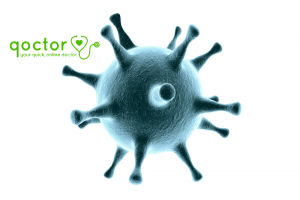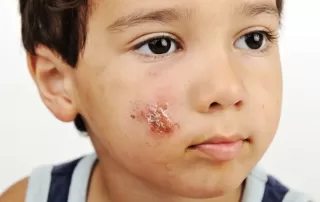Cold Sores
Welcome to Qoctor’s online doctor service which can provide assessment for Cold Sores. Answer some online questions, then book a consultation with an AHPRA-registered doctor. Repeats available (subject to assessment). Please also note, your pharmacist may be able to assist you with over the counter treatments for cold sore.
The consultation fee is $29.99. If a prescription is advised, it can be sent as an eScript to your phone OR electronically to your local pharmacy. Alternatively you can have medication delivered by an Australian partner pharmacy- in this case, the cost of medication is added at the checkout. All treatment and advice is issued subject to your doctor’s assessment.
About Cold Sores
Cold sores are caused by the Herpes Simplex Virus (HSV1), which is spread by skin to skin contact. About 1 in 5 people have cold sores that flare up from time to time. They usually get better without treatment in 7-10 days, though sometimes antiviral creams or tablets may be used to ease symptoms.

FAQs about HSV1 & cold sores
- Cold sores are caused by the Herpes Simplex Virus Type 1, otherwise known as HSV1.
- HSV2 is a similar virus which usually causes genital herpes, but rarely can also cause cold sores around the mouth.
- Cold sores are spread by skin to skin contact, such as kissing someone who has an active cold sore.
- The first infection may not cause any symptoms, but may be triggered later.
- Cold sores can be triggered by stress, fatigue, viral illness, strong UV/sunlight exposure or during menstruation.
- Cold sores are spread by skin to skin contact
- If you have active cold sores you should avoid newborn babies, elderly, or anyone with a weak immune system (e.g on chemotherapy)
- If you have no active cold sores, you’re not usually infectious to others.
- No, usually you do not need any tests to diagnose cold sores.
- The diagnose tends to be obvious, based on history and the appearance of the lesions
- However, if there’s any doubt, your GP can perform a swab and send it to the laboratory for analysis for HSV1.
• People with recurring cold sores occasionally worry that there’s something wrong with their immune system, or that they’re deficient in a vitamin or mineral. But cold sores are very common, and most people who get them are otherwise perfectly well.
• Sometimes tiredness or another viral illness can make you more prone to cold sore flare ups
• If you’re worried, speak to your doctor- they may recommend some general blood tests to check for an underlying cause.
• Usually no particular medication for cold sores is recommended- they naturally get better over 7-10 days.
• There is some general advice when you have active cold sores, such as avoid touching the cold sores; wash hands regularly especially after applying creams or before putting in your contact lenses; and don’t share lip balm or sunscreen.
• Over the counter painkillers like Panadol and Nurofen, or topical anaesthetic gels (e.g Lidocaine) may be helpful for pain/discomfort.
• Antiviral Creams can be bought at your pharmacy- these do not kill the virus but prevent it from multiplying which may reduce symptoms a little.
• Oral antiviral medication may be prescribed to reduce the severity of symptoms, in some suitable cases. This approach may be appropriate if you have severe or frequent cold sores, or a weakened immune system for some reason- speak to your doctor for further advice.
Once you’ve been infected, HSV1 stays in your body. In some people it means cold sores flare up from time to time, in others HSV1 lies dormant, and flares up rarely or not at all.
Health Library- Cold Sores (HSV1)
Chicken Pox- symptoms, treatment & key facts
Chicken Pox spread symptoms vaccine treatment Chicken Pox is a viral infection, caused by the Varicella Zoster Virus, which is a type of herpes virus. Children in Australia are routinely immunised against Chicken Pox at 18 months, as part of a 4 in 1 vaccine with the MMR (called the MMRV vaccine). The Chicken Pox vaccine does not give 100% protection, but prevents infection in around 85% of cases, and gives over 95% protection against severe infection- i.e. if you do get symptoms, they’ll tend to be a lot milder. The Chicken Pox rash consists of itchy water-filled blisters on the body. Other symptoms include fever, runny nose and cough. How do you get Chicken Pox? Chicken Pox can be spread by coughs, sneezes or exposure to the fluid in the blisters It is highly contagious A person is [...]
School sores- causes,symptoms & treatment
What are School Sores and how are they treated? symptoms spread diagnosis treatment What are school sores (impetigo)? School sores, also referred to as Impetigo, is a bacterial skin infection which leads to spots or lesions on the skin. These sores may appear as blisters that then burst and weep, before developing a crust. They are often itchy. The condition is caused by bacteria called staphylococcus (known as “staph” for short) or streptococcus (known as “strep” for short) It commonly affects children of school age. What are the symptoms of school sores (impetigo)? Impetigo typically appears as red sores or blisters that can occur anywhere on the body but are most commonly found around the nose and mouth, or the limbs. These sores may be itchy but are generally not painful. Initially, the sores start [...]
Mumps- what causes it & what are the symptoms?
Mumps- what causes it & what are the symptoms? spread symptoms complications management What is mumps and what causes it? Mumps is a viral illness, which causes swelling of the salivary glands (the glands in the head and neck that produce spit), fever and sometimes other symptoms and complications. It used to be common, but immunisation in childhood with the MMR vaccine has dramatically reduced cases. How is mumps spread? Mumps is spread from person to person by swallowing or breathing in droplets that an infected person has sneezed or coughed. The virus can also be present in an infected person’s urine. Symptoms of mumps tend to occur 2-3 weeks following exposure. However, some people do not show any signs of infection (about 33%) but can still pass it to others. What conditions can be assessed by our [...]



